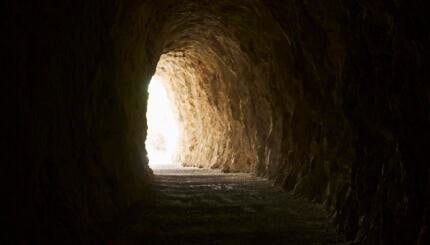In the first book of the Bible we read of the creation of the moon:
God said, “Let there be lights in the expanse of the sky to separate day from night; they shall serve as signs for the set times–the days and the years; and they shall serve as lights in the expanse of the sky to shine upon the earth.” And it was so. God made the two great lights, the greater light to dominate the day and the lesser light to dominate the night, and the stars. And God set them in the expanse of the sky to shine upon the earth, to dominate the day and night, and to separate the light from darkness. And God saw that this was good.
– Genesis 1:14-18
Immediately prior to the exodus from Egypt, God commands the Israelites to mark the months of the year:
With your help, My Jewish Learning can provide endless opportunities for learning, connection and discovery.
The Lord said to Moses and Aaron in the land of Egypt: This month shall mark for you the beginning of the months; it shall be the first of the months of the year for you.
— Exodus 12:1-2
The Book of Numbers briefly describes the celebration of Rosh Chodesh:
And on your joyous occasions-your fixed festivals and new moon days-you shall sound the trumpets over your burnt offerings and your sacrifices of well-being. They shall be a reminder of you before your God: I, the Lord, am your God.
— Numbers 10: 10
This passage from the Book of Numbers is chanted during the traditional synagogue morning service each Rosh Chodesh:
On your new moons you shall present a burnt offering to the Lord: two bulls of the herd, one ram, and seven yearling lambs, without blemish. As meal offering for each bull: three-tenths of a measure of choice flour with oil mixed in. As meal offering for each ram: two-tenths of a measure of choice flour with oil mixed in. As meal offering for each lamb: a tenth of a measure of fine flour with oil mixed in. Such shall be the burnt offering of pleasing odor, an offering by fire to the Lord. Their libations shall be: half a hin [a hin is approximately six quarts] of wine for a bull, a third of a hin for a ram, and a quarter of a hin for a lamb. That shall be the monthly burnt offering for each new moon of the year. And there shall be one goat as a sin offering to the Lord, to be offered in addition to the regular burnt offering and its libation.
— Numbers 28:11-15
The Mishnah describes how torches were lit to provide notification of the sighting of the new moon:
Originally they used to light beacons (to convey the news of the new moon to the Jews in the diaspora of Babylonia). When the Cutheans (Samaritans) adopted evil courses (and lit beacons on the thirtieth day, so as to mislead the Jews in Babylonia), they made a rule that messengers should go forth. How did they light the beacons? They used to bring long poles of cedar and reeds and olive wood and flax fluff which they tied to the poles with a string, and someone used to go up to the top of a mountain and set fire to them and wave them to and fro and up and down until he saw the next one doing the same thing on the top of the second mountain; and so on the top of the third mountain. Whence did they carry the chain of beacons? From the Mount of Olives in Jerusalem to Sartaba, and from Sartaba to Grofina, and from Grofina to Hauran, and from Hauran to Beth Baltin. The one on Beth Baltin did not budge from there but went on waving to and fro and up and down until he saw the whole of the diaspora (the district of Pumbedita in Babylonia) before him like one bonfire. (On seeing the beacon fire, the inhabitants used to light torches.)
— Mishnah, Rosh Hashanah 2.2-4
The Talmud associates Rosh Chodesh observance with the Shekhinah, the Divine Presence:
Rabbi Aha ben Hanina also said in the name of Rabbi Assi in Rabbi Yohanan’s name: Whoever pronounces the benediction over the new moon in its due time welcomes, as it were, the presence of the Shekhinah. For one passage states, “This month” (Exodus 12:2) while elsewhere it is said, “This is my God, and I will glorify Him” (Exodus 15:2). [“This” here connotes something that could be pointed at with one’s finger, and the use of “this” in the two verses suggests that the one who praises God at the periodic renewal of the moon, gives witness to the revelation of divine glory as manifested in natural phenomena.]
— Babylonian Talmud, Sanhedrin 42a
The Talmud recounts a legend of the moon becoming smaller than the sun:
Rabbi Shimon ben Pazzi pointed out a contradiction [in the account of the creation of the sun and moon]. One verse says, “God made the two great lights” (Genesis 1:16), and immediately the verse continues, “The greater light … and the lesser light.” The moon said unto the Holy One, blessed be He, “Sovereign of the Universe! Is it possible for two kings to wear one crown?” He answered, “Go then and make yourself smaller.” “Sovereign of the Universe!” cried the moon. “Because I have suggested that which is proper must I then make myself smaller?” He replied, “Go and you will rule by day and by night.” “But what is the value of this?” cried the moon. “Of what use is a lamp in broad daylight?” He replied, “Go. By you, Israel shall reckon the days and the years.” “But it is impossible,” said the moon, “to do without the sun for the reckoning of the seasons, as it is written, ‘They shall serve as signs for the set times-the days and the years’ (Genesis 1:14).” “Go. The righteous shall be named after you [righteous people shall be named “the Small” after the moon, which had become the small light] as we find, Jacob the Small [se Amos 7:2], Samuel the Small [a 1st century rabbi], David the Small [see I Samuel 17:4].
On seeing that it would not be consoled, the Holy One, Blessed be He, said, “Bring an atonement for Me making the moon smaller.” This is what was meant by Rabbi Shimon ben Lakish when he declared, “Why is it that the male goat offered on the new moon is distinguished in that there is written concerning it ‘unto the Lord’ (Numbers 28: 15)? Because the Holy One, Blessed be He, said, ‘Let this male goat be an atonement for Me for making the moon smaller.'”
— Babylonian Talmud, Hullin 60b
Pirkei de-Rabbi Eliezer recounts legends from the time of Creation until the wanderings of the children of Israel in the desert.
The women heard about the construction of the golden calf and refused to submit their jewelry to their husbands. Instead they said to them: “You want to construct an idol and mask which is an abomination, and has no power of redemption? We won’t listen to you.” And the Holy One, Blessed be He, rewarded them in this world in that they would observe the new moons more than men, and in the next world in that they are destined to be renewed like the new moons.
— Midrash, Pirkei deRabbi Eliezer 45 (circa 750)
Exodus Rabbah
is an exegetical and homiletic work on the Book of Exodus compiled in the years 900-1000, including material from much earlier periods:
You find that if the moon does not appear in the sky at night, the world is so dark that a man cannot walk about even within the city, but as soon as the moon appears in the sky, all rejoice and walk about. So it was in the days of Ahasuerus who decreed that Israel should be destroyed, slain, and made to perish; but Esther came and brought light to Israel, for it says, “The Jews had light and gladness, and joy and honor” (Esther 8:16) Should you inquire why Esther is compared to the moon, the answer is that just as the moon renews itself every thirty days, so did Esther say, “But I have not been called to come in unto the king these thirty days” (Esther 4:11).
— Midrash, Exodus Rabbah 1 5:6
The rabbis of Exodus Rabbah
comment on the commandment in Exodus
12:2
to mark the months:
We may illustrate by the parable of a king unto whom a son was born, whereupon he made a joyful celebration; but the son was taken captive and spent a long time in captivity. On his release, the king fixed an anniversary. So, too, prior to Israel’s descent into Egypt, they counted by years; but after they had gone down to Egypt and become enslaved there, God performed miracles for them, and they were redeemed; and then did they begin to count the months, as it says, “This month shall mark for you the beginning of the months” (Exodus 12:2).
— Midrash, Exodus Rabbah 15:9 (900-1000)
Rashi, a medieval Torah commentator, discusses a passage from the Talmud about the public reading of the Torah on weekdays, holidays, and new moons:
“New months.” There is no absolute prohibition against work, yet women do not perform work on those days I learned from my aged teacher, may his memory be for a blessing, that this commandment was given to them [women] because they did not submit their jewelry for the golden calf.
Reprinted with permission from Moonbeams: A Hadassah Rosh Hodesh Guide, edited by Carol Diament, published by Hadassah.
Mishnah
Pronounced: MISH-nuh, Origin: Hebrew, code of Jewish law compiled in the first centuries of the Common Era. Together with the Gemara, it makes up the Talmud.
Rosh Hashanah
Pronounced: roshe hah-SHAH-nah, also roshe ha-shah-NAH, Origin: Hebrew, the Jewish new year.
Talmud
Pronounced: TALL-mud, Origin: Hebrew, the set of teachings and commentaries on the Torah that form the basis for Jewish law. Comprised of the Mishnah and the Gemara, it contains the opinions of thousands of rabbis from different periods in Jewish history.
Torah
Pronunced: TORE-uh, Origin: Hebrew, the Five Books of Moses.



